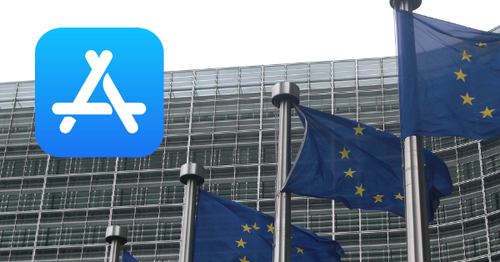
Following the European Commission's announcement in June that Apple violated the Digital Markets Act with its App Store anti-steering rules, the world's most valuable company has revised its policy.
Apple introduced a new fee structure for the EU App Store's "link-outs." This allows app developers to include a link that redirects customers to a web page where they can complete a transaction.
For context, the tech blog 9to5Mac explained:
Previously, Apple enforced strict rules that dictated how apps in the EU were allowed to link out. This included requirements that the link be statically defined, and go directly to their own website, without any parameters to identify the logged-in user in the URL. This limited the ability of apps to directly send users to a webpage where they could pay to add upgrades to their account.
As for the new fee structure, 9to5Mac explained further:
Under today's changes, all of those restrictions are now gone. Apps can offer actionable links with as many dynamic URLs as they please. These links can take the user to anywhere, including as a way to promote other sales channels like alternative app marketplaces. The URLs can include parameters, as long as those parameters are not used for advertising or user profiling.
These links also used to be required to kick the user outside of the current app and into their web browser, like Safari. However, Apple is now allowing these links to be opened inside the originating app, as a modal web view.
Apple is also updating the user disclosure sheet with a new design that is more friendly, and includes an interface toggle for users to opt-out of seeing disclosure sheets when tapping external purchase links in the future. For now, developers have to continue to implement this sheet manually, but Apple announced it will be automatically managed and presented by the ExternalPurchaseCustomLink API in a future iOS update.
Moreover, developers can now take advantage of these capabilities in the EU, without agreeing to alternative business terms. That means they can remain in the App Store and avoid paying the Core Technology Fee on installs. However, there is a new substitute fee structure instead …
Apple will also introduce two new fee structures for apps that link out of its App Store, including an initial 5% acquisition fee for new users and a 10% store services fee for any sales made by app users on any platform within the 12 months of the app installation.
9to5Mac pointed out:
Apple says the new structure results in lower fees for developers in both the alternative and existing terms for linking out, especially for existing users. This is because previously Apple charged upwards of 17% and the Core Technology Fee, for the privilege of linking out to an alternative payment method.
In June, the commission officially investigated Apple App Store's anti-steering rules outside the platform.
Apple is changing its App Store policies to comply with the Digital Markets Act and avoid fines by the EU.
Following the European Commission’s announcement in June that Apple violated the Digital Markets Act with its App Store anti-steering rules, the world’s most valuable company has revised its policy.
Apple introduced a new fee structure for the EU App Store’s “link-outs.” This allows app developers to include a link that redirects customers to a web page where they can complete a transaction.
For context, the tech blog 9to5Mac explained:
Previously, Apple enforced strict rules that dictated how apps in the EU were allowed to link out. This included requirements that the link be statically defined, and go directly to their own website, without any parameters to identify the logged-in user in the URL. This limited the ability of apps to directly send users to a webpage where they could pay to add upgrades to their account.
As for the new fee structure, 9to5Mac explained further:
Under today’s changes, all of those restrictions are now gone. Apps can offer actionable links with as many dynamic URLs as they please. These links can take the user to anywhere, including as a way to promote other sales channels like alternative app marketplaces. The URLs can include parameters, as long as those parameters are not used for advertising or user profiling.
These links also used to be required to kick the user outside of the current app and into their web browser, like Safari. However, Apple is now allowing these links to be opened inside the originating app, as a modal web view.
Apple is also updating the user disclosure sheet with a new design that is more friendly, and includes an interface toggle for users to opt-out of seeing disclosure sheets when tapping external purchase links in the future. For now, developers have to continue to implement this sheet manually, but Apple announced it will be automatically managed and presented by the ExternalPurchaseCustomLink API in a future iOS update.
Moreover, developers can now take advantage of these capabilities in the EU, without agreeing to alternative business terms. That means they can remain in the App Store and avoid paying the Core Technology Fee on installs. However, there is a new substitute fee structure instead …
Apple will also introduce two new fee structures for apps that link out of its App Store, including an initial 5% acquisition fee for new users and a 10% store services fee for any sales made by app users on any platform within the 12 months of the app installation.
9to5Mac pointed out:
Apple says the new structure results in lower fees for developers in both the alternative and existing terms for linking out, especially for existing users. This is because previously Apple charged upwards of 17% and the Core Technology Fee, for the privilege of linking out to an alternative payment method.
In June, the commission officially investigated Apple App Store’s anti-steering rules outside the platform.
Apple is changing its App Store policies to comply with the Digital Markets Act and avoid fines by the EU.
Loading…



